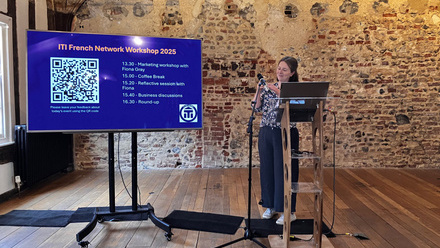Feedback and support - essential ingredients for growth
In this month's CPD blog we hear the perspective of language service provider LKT who offer a training programme geared specifically towards newcomers in the profession. But CPD doesn't stop there.
The mentorship concept behind LKT's Translator Academy is all about providing a constant source of support and advice, with the mentor providing input on every single project and the mentee’s work consistently undergoing full revision prior to delivery.
While the overriding aim is for the mentee to take on projects independently, cutting someone entirely adrift after they’ve reached the end of their training isn’t what our team philosophy is about. Otherwise, the people working on our projects would become little more than a network of floating, independent vessels – they might all be aiming for the same goal of delivering excellent translations, but they wouldn’t have that feeling of being part of something; the reassurance that there is access to a rope that provides a source of support even if it isn’t permanently tethered to the dock.
That’s where our peer review and feedback system comes in. Designed to ensure that every member of the team, no matter how senior, benefits from regular feedback, it essentially picks up from the point at which the induction training programme offered by the Translator Academy ends. Some members of our in-house team and a number of our external partners (who benefit from mentoring in the form of quarterly peer reviews in addition to feedback provided during the course of revising projects on a regular basis) have been working as translators for fifteen or even twenty years, but they will be the first to tell you that passing a certain point in your career doesn’t mean that you’ll never make a typo or misread a sentence. It happens!
Mentoring in one form or another is at the heart of the LKT model, but we know that our approach is unique, and most of our peers are working as independent freelancers without direct access to an in-house support infrastructure. As a new graduate looking to get started in the language services industry, you might find yourself feeling isolated and lacking support precisely when you need it most.
Finding and working with a mentor can help you to make the transition from translating at university to the professional world and boost your confidence, and it might even lead to making valuable contacts and finding new sources of work. There is an increasing requirement for combined translation and revision services in the market – you could collaborate with your mentor to meet this requirement. Even if your mentor works with a different language combination or has a different specialist subject area, valuable relationships that are mutually beneficial can be formed. We all know that there’s no such thing as “just” a translator, especially if you’re a freelancer – one day you’re a marketeer, the next a salesperson, the next an accountant, the next an IT engineer... do I need to go on?! I’m coming up to 25 years in the industry and only very recently I’ve forged a relationship with a fellow owner of an LSP through which we provide one another with peer support – mentoring in another guise, you might say.
If you’re a newcomer to the profession there’s no doubt that you’ll benefit from having a mentor, and if you’re a more experienced professional there’s never a time to stop learning. Moreover, you could even benefit from stepping up as a mentor. Whether you’re giving or receiving, so to speak, mentoring – in its many and varied forms – provides a valuable source of support and learning. And don’t forget to record the time spent in your ITI CPD log!






